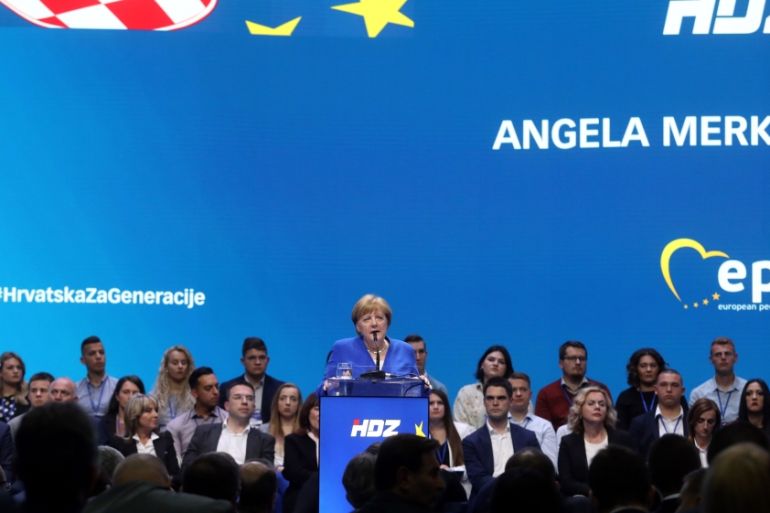Merkel: No knowledge of nationalist song played at Croatia rally
Critics say German chancellor should confront Croatian HDZ party’s ‘irredentist’ agenda shown at EU election rally.

Following a wave of negative media reaction, German Chancellor Angela Merkel‘s office has denied any knowledge of a controversial song played at a campaign rally by the Croatian ruling party which she attended last week in Zagreb.
The song in question – Lijepa li si (How beautiful you are) – describes love for the different regions of Croatia, but it also includes a verse glorifying “Herceg-Bosna”, an unrecognised wartime para-state founded on Bosnian territory in 1991.
Keep reading
list of 4 itemsHas South Africa’s ANC failed to live up to its promises?
April 27, 1994: What has changed in South Africa 30 years after apartheid?
Jobless engineers, MBAs: The hidden army of Indian election ‘consultants’
Led by Croatia, six of its leaders were convicted of war crimes in 2017 by the United Nations’ International Criminal Tribunal for former Yugoslavia (ICTY) in The Hague.
They were found guilty of participating in a “joint criminal enterprise”, which expelled the Muslim population in Bosnia during the war in the early 1990s with the aim of creating a “Greater Croatia”, according to the ICTY.
Written in 1998, the song is regularly performed by the Croatian ultra-nationalist singer Marko Perkovic Thompson who has a track record of glorifying the Ustasha fascist, Nazi-allied puppet state of Croatia during World War II.
Due to his controversial views and songs, Thompson’s performances have been banned in several European countries, including in Germany.
Zagreb rally
On May 18, Merkel attended the rally in the run-up to this week’s European Parliament elections to support the ruling Croatian Democratic Union (HDZ) party. Accompanying her was Manfred Weber, the lead candidate for the centre-right European People’s Party (EPP) in the elections.
Merkel’s Christian Democratic Union party is also a member of the EPP bloc in parliament.
According to Croatian daily Vecernji List, it was not until a Croatian band took to the stage at the rally to perform Thompson’s Lijepa li si that the atmosphere turned euphoric, with Andrej Plenkovic, Croatia’s prime minister, and HDZ leader, clapping to the rhythm.
In stark contrast to the song, Merkel had urged voters to reject nationalism in the European Union election in her speech, calling it “the enemy of the European project”.
“Chancellor Merkel was not familiar with what songs will be played during the party gathering in Zagreb, nor did she know of the content of those songs,” a spokesperson from her office told Bosnian and Croatian media on Wednesday, distancing the chancellor from the controversy. “Chancellor Merkel has during her visit to Zagreb clearly expressed her stance that she opposes nationalism.”
German media and NGOs expressed disappointment over the incident, with Berlin’s Der Tagesspiegel writing that Merkel and Weber were unaware of the implications of Thompson’s song, calling the singer a “self-confessed Ustasha bard”.
“[The German guests’] warnings of the dangers of nationalism were overshadowed in Zagreb by conspicuously nationalist discords,” it wrote.
A spokesperson for the HDZ party did not reply to Al Jazeera for comment before the time of publication. The HDZ, considered to be centre-right, often presents itself as a party espousing “European values”, however, it has also shown support for convicted Croat war criminals.
‘Radical, irredentist agenda’
Toby Vogel, a senior associate at the Democratisation Policy Council, a Berlin-based initiative for democratisation accountability, called the choice of the song a “provocation” directed against Merkel and Weber, as well as an attempt by the HDZ to use the German guests for their “radical agenda”.
While Merkel’s office reiterated its anti-nationalist message in their statement, it did not address the fact that she had been contradicted by her Croatian hosts, Vogel told Al Jazeera.
“She gave that message [of anti-nationalism] in Zagreb but at the same time she said it at the rally where Thompson’s song was being performed – and that completely undercuts the message,” added Vogel, a foreign affairs writer based in Brussels.
“Her party should demand an apology from the HDZ for playing a clearly irredentist, radical, nationalist song at the campaign rally where she was present.”
Vogel said that HDZ’s “provocation” was part of a pattern of Croatian official government behaviour towards Bosnia.
“This is a governing party in an EU member state that is directly interfering in the affairs of a neighbouring non-EU member state. I actually would say that Croatia is bullying Bosnia and has been for many years. This isn’t an isolated thing.”
The HDZ and its sister party in Bosnia have long advocated for “ethnically ‘federalising’ the country” and have embraced convicted war criminals, Vogel wrote in an op-ed for Balkan Insight on Thursday with political analyst Kurt Bassuener.
Croatia has regularly been accused of attempting to undermine Bosnia’s sovereignty, a continuation of its irredentist aims pursued during the war.
|
|
“That’s what I think is really troubling. The main message here is clearly that Croatia is not a friend of Bosnia. Croatia [has been] trying to undermine the constitutional setup of the country,” Vogel said.
On May 20, the Bosnian Advocacy Centre (BAC), an independent NGO which advocates for a free and democratic Bosnia, sent a letter to the German embassy in Sarajevo expressing disappointment and asking for clarification regarding the “set of unclear circumstances”.
Ismail Cidic, the president of the BAC, told Al Jazeera that it’s disappointing that Merkel did not apologise following the event.
“The people of Bosnia and Herzegovina have suffered a lot from the horrific crimes perpetrated by the so-called Herceg-Bosna in the 1990s,” Cidic said.
“It does not come as a surprise that many people in Bosnia see Chancellor Merkel’s move as an endorsement of such ideas despite the fact that she always emphasises the importance of European and democratic values.”